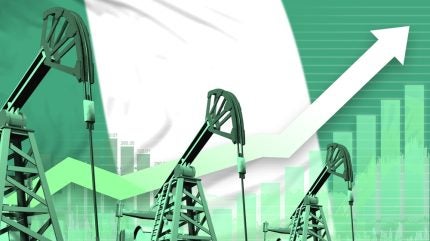
After months of denial, the Nigerian National Petroleum Corporation (NNPC) has finally admitted to being in significant debt to an array of petrol suppliers.
In July, several US media outlets reported that the firm’s debt had passed $6bn as it has struggled to cover the gap between fixed pump prices and international fuel costs.
Then, a company statement from early September – attributed to chief communications officer Olufemi Soneye – acknowledged that the “financial strain has placed considerable pressure on the company and poses a threat to the sustainability of fuel supply.”
Following the end of fuel subsidies in 2023, Nigerian motorists have now been hit with price increases of over 45%, reaching N855 ($0.5) per litre from N617. The Nigerian Labour Congress, an umbrella organization for trade unions, has called on president Bola Tinbu to address the hikes.
And yet, NNPC’s financial results for 2023 showed a record N14trn ($8.6bn) in crude oil sales, marking a significant increase from the N3.5trn generated in the previous year.
In August, NNPC stated that it is targeting two million barrels per day (mbbl/d) bpd) crude oil production by the end of 2024. However, this goal is being hindered by rampant oil theft in Nigeria, with NNPC turning to the Economic and Financial Crimes Commission (EFCC) to recoup its losses.

US Tariffs are shifting - will you react or anticipate?
Don’t let policy changes catch you off guard. Stay proactive with real-time data and expert analysis.
By GlobalDataAs recently as early September, elements of Nigeria’s army intercepted and disrupted a large illegal oil bunkering operation in the southern region of the country.
Several local news sources reported that the Nigerian Army had found over 198,000 litres of stolen crude oil in a barge from the NNPC flow station in Rivers State.
Further complicating matters is the NPCC’s ongoing conflict with the 650,000bpd Dangote Refinery over fuel imports, with its stake in the major project recently being cut from 20% to 7.2% due to non-payments.
NNPC has since revealed its intention to sell assets to boost profit margins and potentially go public, subject to shareholder approval.
The company did not respond to Offshore Technology’s request for comment.
The slippery slope of Nigerian oil
But for all NNPC’s oil, gas and financial power, its debt is a major cause of concern for the Nigerian oil market, as it is the only entity licensed to operate within in the country’s vast petroleum industry.
It operates through subsidiaries that encompass the entire spectrum of operations, including exploration and production, gas development, refining, distribution, petrochemicals, engineering and commercial investments.
Nigeria is one of the biggest crude oil producers and exporters in Africa, and accounts for around 20% of the continent’s production, followed by Algeria, Libya, and Egypt.
In 2024, NNPC has had the highest net entitlement for marketed gross crude oil and condensate production in the country, as confirmed by Offshore Technology’s parent company GlobalData.
NNPC has said it is “actively collaborating with relevant government agencies and other stakeholders to maintain a consistent supply of petroleum products nationwide”.
According to professional services company PricewaterhouseCoopers, despite being a major source of revenue, Nigeria’s oil sector has historically lagged behind other sectors in terms of GDP contribution. Moreover, the growth of the sector will be further hindered by the scale of NNPC’s debt.
In its statement regarding the debt, NNPC cited the 2021 Petroleum Industry Act (PIA), which established the organisation as a limited liability corporation to broaden its access to international markets.
GlobalData analysis highlights that despite the attempt to reform Nigeria’s oil industry under the PIA, major structural problems remain unresolved ahead of the start of an anticipated natural production decline in 2027.
Nigeria is also unlikely to break out of its reliance on oil imports, which are managed solely by NNPC, until its refineries are fully operational and can support the country’s demand of approximately 50-60 million litres of gasoline per day.
Successful sales of Nigerian oil serve as a crucial buttress for the nation’s public debt, which stands at N121tn ($73bn). In June, the country’s Debt Management Office reported that the country’s debt-to-GDP ratio crossed 50% for the first time – the higher the ratio, the less likely that country will be able to pay back its debt, making new lenders nervous.
Nigeria’s Sovereign Wealth Fund was established in 2011 to invest the difference between the actual and budgeted market prices for oil. In 2023, the fund had grown to N2.25trn, managed by the Nigeria Sovereign Investment Authority (NSIA).
However, this is not nearly enough to address the NNPC’s or Nigeria’s debts, and is unlikely to be used to help to pay back the money owed.
US news sources recently reported that Nigeria will likely spend N5.4tn in 2024 (some 50% more than in 2023) to keep petrol prices fixed, while borrowing an extra N6.6tn to plug gaps in its budget. This is on top of the fallout from the currency crisis seen earlier in 2024 as the naira reached record lows.
A report from the International Monetary Fund confirms that any further adverse shocks to oil production or prices would hit Nigeria’s growth, the fiscal and external position, and exacerbate inflationary and exchange rate pressures.
In turn, this limits the government’s social spending. More than 40% of Nigerians live in poverty and rely on welfare handouts such as the National Social Investment Programme and the National Healthcare Policy.



